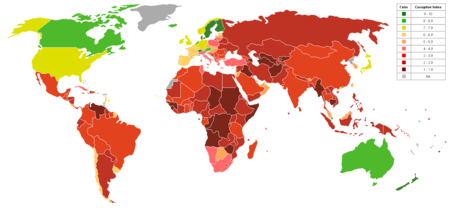| Revision as of 00:26, 22 January 2008 editRealkyhick (talk | contribs)Extended confirmed users42,073 edits Proposing article for deletion per WP:PROD. using TW← Previous edit | Revision as of 00:27, 22 January 2008 edit undoPerspicacite (talk | contribs)6,334 edits revert, vandalism?Next edit → | ||
| Line 1: | Line 1: | ||
| {{dated prod|concern = {{{concern|Blatantly non-neutral POV. Does not assert notability. Essentially an essay or diatribe.}}}|month = January|day = 22|year = 2008|time = 00:26|timestamp = 20080122002628}} | |||
| <!-- Do not use the "dated prod" template directly; the above line is generated by "subst:prod|reason" --> | |||
| ] | ] | ||
| '''Corruption in Angola''' is a pervasive phenomenon, hindering economic growth and government-sponsored liberalization programs. | '''Corruption in Angola''' is a pervasive phenomenon, hindering economic growth and government-sponsored liberalization programs. | ||
Revision as of 00:27, 22 January 2008

Corruption in Angola is a pervasive phenomenon, hindering economic growth and government-sponsored liberalization programs.
In 2004, Human Rights Watch found the Angolan government could not account for US$4 billion spent between 1997 and 2002. Transparency International ranked Angola 142 out of 163 countries in the Corruption Perception Index just after Venezuela and before the Republic of the Congo with a 2.2 rating. The The Heritage Foundation gave a 47.1% "free" rating in its Index of Economic Freedom in 2008.
Negocios are corrupt business deals in Angola.
See also
References
- "Angola: New OPEC Member Should Tackle Corruption Not Critics" (HTML). Human Rights Watch. 2006. Retrieved 2008-01-21.
- J. Graf Lambsdorff (2006). "Corruption Perceptions Index 2006" (HTML). Transparency International. Retrieved 2008-01-21.
- "Index of Economic Freedom" (HTML). The Heritage Foundation. 2008. Retrieved 2008-01-21.
- James, W. Martin (2004). Historical Dictionary of Angola. p. 112.
This Angola-related article is a stub. You can help Misplaced Pages by expanding it. |